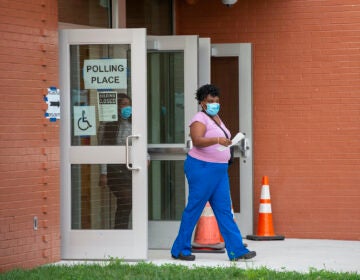Race to watch: AG Kathy Jennings and challenger Julianne Murray battle to be Delaware’s chief crime fighter
Jennings says her approach to equal justice has earned the right to a second term. Julianne Murray says the incumbent is soft on gun criminals.
Listen 2:03
Democratic incumbent Kathy Jennings (left) is being challenged by Republican Julianne Murray. (Cris Barrish/courtesy of Julianne Murray)
Ask us: As Election Day draws near, what questions do you have?
Julianne Murray paints a picture of a Delaware where armed criminals get gun charges dropped and are released on low bail, prosecutors are at odds with local police, and the Attorney General’s Office makes decisions based on politics — not the law.
Kathy Jennings, the first-term incumbent attorney general, counters with a canvas that shows violent crime falling, in large part because police and prosecutors work so closely together to track guns, and where no one is above the law, even leaders in her own Democratic party.
Murray, a Republican Sussex County lawyer and 2020 gubernatorial candidate, and Jennings, a Wilmingtonian who has been a prosecutor for more than three decades, face off Nov. 8 in the race for the state’s top law enforcement post.
A recent poll by the University of Delaware found Jennings with a 13 percentage point lead in a state where Democrats hold a nearly 2 to 1 registration advantage over Republicans and hold all nine statewide elective offices.
Both candidates, who have also worked as defense attorneys during their careers, recently shared their contrasting views of how the office is functioning.
Murray, a native of Alexandria, Virginia, who moved to Delaware two decades ago, was a political newcomer in 2020 when she ran for governor. She and her husband, who own a condo in Dewey Beach, had sued the state after Gov. John Carney instituted a ban on short-term rentals as part of his emergency coronavirus restrictions. Some party members urged her to run for governor, and she took the bait, winning a six-candidate GOP primary before losing to Carney with just 39% of the vote.
She said her eyes had already been on the Attorney General’s Office, since that June when Jennings dropped disorderly conduct charges and other misdemeanor charges against 22 people arrested near Dover after a protest over George Floyd’s death at the hands of Minneapolis police officers.
Jennings’ actions triggered blowback from the state’s two largest police unions and the Delaware Police Chiefs’ Council.
In a rare joint public statement, the groups wrote that officers “are now under attack not only by criminals or violent protesters, but by the Attorney General herself.”
The discord remains today. Both unions — the Delaware Fraternal Order of Police and the Delaware State Troopers Association — are endorsing Murray.
Murray said that when the unions wrote what was “basically a no confidence letter’’ more than two years ago, “I realized that there was a broken relationship between the Department of Justice and law enforcement in the state.”
She called Jennings’ decision to drop all the charges one that was “riding the political wave nationally in the heart of the ‘defund the police’ movement. And you know, cops are bad.”
So midway through 2021, Murray said she decided to take on Jennings at the ballot box. “This for me is trying to repair the relationship’’ between the office and police. “I think that that will benefit Delaware.”
Jennings countered that notwithstanding the unions’ letter, she works with police officers on a daily basis ”to lower violent crime” and says the relationship is strong.
She pointed out that gun violence is lower this year statewide after a 2021 that saw Wilmington set a homicide record.
“That doesn’t happen unless we are in lockstep with law enforcement in this fight against violence,’’ Jennings said. “So whether it be gun violence, domestic violence, violence against children, we’re together and we speak with one voice. And that doesn’t happen unless you have the trust of the police.’’
As for the highway protesters, Jennings says they “were not charged with any violence. They were charged with the lowest level charge in our state, which is disorderly conduct.”
She says she met with protesters and Dover police decided that “if those prosecutions had gone forward, it still would have been a city divided on itself, because the community was upset, the police were upset, and we needed time to heal. … If those prosecutions had made their way through the system, I’m convinced that we would not have seen the kind of healing and building of trust and lowering of crime that we’ve seen.”
Sparring over issue of dropped gun charges
Murray has also argued that Jennings is soft on gun crimes, pointing to a May 22 report from the Delaware Statistical Analysis Center and the Delaware Criminal Justice Council.
She points to data in that report that shows how prosecutors disposed of two specific charges: possession of a deadly weapon during the commission of a felony, and possession of a firearm by a prohibited person.
Both crimes carry a mandatory minimum prison sentence, but the report shows that from 2019 through 2021, prosecutors dropped those charges about 85% of the time.
“The Numbers Don’t Lie,’’ her campaign proclaims in a handout, and Murray says it’s incumbent on Jennings to explain why that has occurred. Jennings took office in January 2019.
Jennings said Murray is cherry picking from the report and leaving out a critical sentence from a 2021 report that shows how effective the office has been in prosecuting gun charges.
“Charge-based analysis is an inadequate characterization of criminal justice system operations,’’ the report provided by Jennings said. “Cases involving weapons often have multiple associated weapon or non-weapon charges; conviction on a weapon charge is not necessarily required for what could be regarded as successful prosecution.”
The report said that previous analyses “performed for the Department of Justice show Superior Court case conviction rates slightly above 88% for cases with indictments on firearm charges.”
Jennings said Murray’s claim is “a gross misinterpretation of the way the criminal justice system works.”
She pointed out that in gun cases with multiple charges, such as murder or attempted murder, the highest level charge guarantees a longer prison sentence and that dropping lesser charges doesn’t affect the prosecution. To argue otherwise is “ridiculous and it’s nonsense,’’ Jennings said.
“If, for example, say we have a case where someone’s charged with murder and they’re charged with a firearm during the commission of that murder,” Jennings said. “They get convicted of the murder but not the firearm, or they plead guilty to the murder and not the firearm. That person’s going to jail for the rest of his life.”
Murray also says that Jennings has “flip-flopped” on the issue of cash bail, stating in 2021 in her legislative priority statement and on camera that she wanted to eliminate cash bail for criminals who are detained on serious crimes.
“Delaware’s bail system isn’t working,’’ the priority statement said. “Nobody should be in jail just because of their poverty; and violent criminals should never walk free just because of their wealth. It’s time for us to end cash bail, once and for all.”
Yet in 2021, the General Assembly passed a bill that established cash bail as a baseline for courts to consider for people accused of 38 serious offenses, including certain gun crimes, assault charges, rape, sex crimes against children and other high-level felonies.
Murray said Jennings is now saying she’s “done a lot’’ in strengthening bail requirements and “she’s keeping violent people off the street. But in ‘21, she was saying, ‘Let’s end cash bail.’”
Jennings’ campaign didn’t address questions about her change in position on cash bail, but rather, said that with the 2021 bill, she “led the fight to fix our broken bail system” and the result has been an “increase in secured and cash bail for violent offenders.”
Jennings had 13-point lead in recent university poll
Murray triumphed last month in her lawsuit against the state’s new no-excuse vote by mail law. The state Supreme Court ruled the law unconstitutional.
Murray’s argument, which the justices supported over those of Jennings’ chief deputy attorney general, was that a constitutional amendment, not a simple majority, was needed.
She said she’s not against voting by mail, only the way lawmakers tried to circumvent the Constitution, and that voters should realize that she will be just as tenacious about criminal and civil matters as attorney general.
Murray realizes that the registration and poll numbers are against her as a statewide candidate from southwestern Sussex County. In addition, Jennings has outraised her and is airing television commercials, which Murray has not done.
The challenger hopes voters give her a chance, though.
“At the end of the day, crime and public safety cross party lines,’’ Murray said. “This shouldn’t be about Democrat or Republican or unaffiliated. And I’ve gotten quite a bit of good feedback.”
Jennings says she’s not getting complacent in the final days of the campaign, despite her lead and registration advantage.
“I feel confident that I have the trust of the citizens I serve, and I am incredibly grateful to the people who have contributed to my campaign,’’ the incumbent said. “I’ve outraised her because of it.
“The poll numbers are a sign of strength. But if you know me, and I think you do, I am running like I’m 10 points behind because I’m not taking anything for granted, nor should I.”

Your go-to election coverage
WHYY is your source for fact-based, in-depth journalism and information. As a nonprofit organization, we rely on financial support from readers like you. Please give today.








